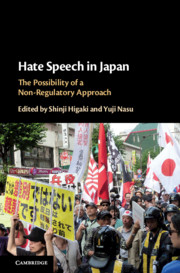Book contents
- Hate Speech in Japan
- Hate Speech in Japan
- Copyright page
- Contents
- Tables
- Figures
- Contributors
- Acknowledgements
- Abbreviations
- Introduction
- Part I Outline
- Part II History
- Part III Legal Framework
- 7 Hate Speech and Criminal Law Frameworks in Japan
- 8 Tort Liability for Hate Speech in Japan
- 9 The Frameworks of the Hate Speech Local Ordinances
- 10 The Legislative Process Leading to the Hate Speech Elimination Act
- 11 The Hate Speech Elimination Act
- Part IV Cases
- Part V Multidisciplinary Debates
- Part VI Current Issues
- Book part
- Index
10 - The Legislative Process Leading to the Hate Speech Elimination Act
from Part III - Legal Framework
Published online by Cambridge University Press: 15 January 2021
- Hate Speech in Japan
- Hate Speech in Japan
- Copyright page
- Contents
- Tables
- Figures
- Contributors
- Acknowledgements
- Abbreviations
- Introduction
- Part I Outline
- Part II History
- Part III Legal Framework
- 7 Hate Speech and Criminal Law Frameworks in Japan
- 8 Tort Liability for Hate Speech in Japan
- 9 The Frameworks of the Hate Speech Local Ordinances
- 10 The Legislative Process Leading to the Hate Speech Elimination Act
- 11 The Hate Speech Elimination Act
- Part IV Cases
- Part V Multidisciplinary Debates
- Part VI Current Issues
- Book part
- Index
Summary
The author of this chapter is a member of the Upper House of Japan who proposed and established the Hate Speech Elimination Act: a philosophical law that includes no penalty provisions because if punishments were imposed on the grounds of the content of expression, then the government would have the authority to decide which expressions were to be subject to punishment – an obvious violation of the ‘freedom of expression’ provided for under the Constitution of Japan. In this chapter, the author discusses the importance of empowering a society in which everyone spontaneously raises their own voice and acts to eliminate hate speech, rather than prescribing a society in which people think, ‘Hate speech will not disappear unless it is punished.’ Through the effects of the Act, local governments and judiciaries were finally able to define hate speech as ‘unacceptable’ and use their own discretion to implement measures accordingly. Even though it is a philosophical law, the Act has therefore raised public awareness and inspired a mass movement seeking to eliminate discrimination voluntarily.
- Type
- Chapter
- Information
- Hate Speech in JapanThe Possibility of a Non-Regulatory Approach, pp. 223 - 236Publisher: Cambridge University PressPrint publication year: 2021

